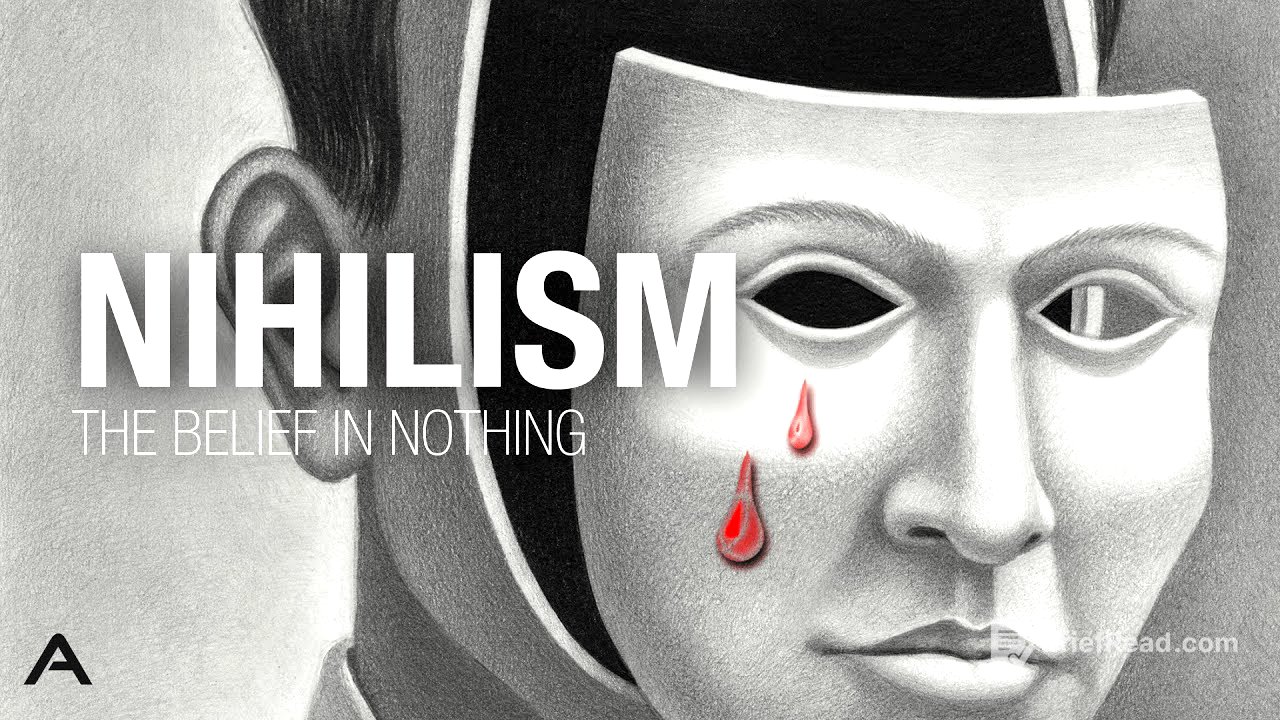TLDR;
This video explores nihilism, the belief in nothing, by examining its core tenets, differentiating it from related philosophies like pessimism, cynicism, and apathy, and discussing its various forms, including political, ethical, and existential nihilism. It addresses the fundamental question of "why" and how the inability to answer it leads to nihilistic conclusions. The video also touches on Friedrich Nietzsche's complex views on nihilism, both as a destructive force and a potential catalyst for creating new values. Finally, it reflects on contemporary nihilism in modern society and suggests finding personal meaning in a seemingly meaningless existence.
- Nihilism is the belief in nothing, questioning the inherent meaning or value in life.
- It is distinct from pessimism, cynicism, and apathy, each holding different perspectives on existence and human motivation.
- Friedrich Nietzsche viewed nihilism as both a threat to civilization and an opportunity to create new values.
- Contemporary society exhibits signs of a nihilistic outbreak, with traditional beliefs and moral structures being questioned.
- Despite the apparent meaninglessness of life, individuals can still find personal meaning and purpose.
Nihilism: The Belief in Nothing [0:00]
The video starts by highlighting the fundamental uncertainties of human existence, specifically our lack of knowledge about what came before birth and what will happen after death. This uncertainty makes it difficult to determine the meaning or importance of our lives. The inability to answer questions about our origins and destination leads to the persistent question of "what is the meaning of life?" that has plagued humanity. While many find solace in religion or personal connections, nihilists believe that life is inherently meaningless, and all actions and emotions are senseless.
Human Uncertainty About Past and Future [0:27]
The discussion centers on how uncertainty about the past and future fuels the search for life's meaning. The inability to definitively answer where we come from or where we are going raises doubts about the significance of our present actions. This uncertainty has led humanity to grapple with the question of life's meaning, with many finding comfort in various ideologies, such as religion, love, or the mere existence of life itself. However, nihilists maintain that life is meaningless, rendering all actions and emotions without purpose.
What is Nihilism: The Belief in Nothing [1:27]
Nihilism is defined as the belief in nothing, a concept that many people encounter at some point in their lives when questioning their beliefs and values. This often occurs during periods of transition and growth, as individuals form their own views about the world. The questioning process typically begins with the simple question "why," which can challenge the foundations of one's beliefs. By repeatedly asking "why," individuals may reach a point where there are no answers, leading to the conclusion that there is nothing.
Understanding Nihilism vs Other Philosophies [2:44]
Nihilism, derived from the Latin word "nihil" meaning "nothing," is often mistaken for pessimism, but the two philosophies differ significantly. Pessimists believe in the worst outcome and focus on the negatives, while nihilists do not believe in anything, including good or evil. Nihilists view morality as a human construct, asserting that the world simply exists without inherent good or evil. Using the metaphor of a glass cup, optimists see it as half full, pessimists as half empty, and nihilists suggest discarding the cup entirely, as its fullness or emptiness is irrelevant in the face of inevitable death.
Comparing Nihilism to Cynicism and Apathy [4:30]
Nihilism is often compared to cynicism and apathy, but these philosophies also have distinct differences. Cynics believe that people are always motivated by self-interest and lack faith in human goodness, implying that good exists but not within humans. Nihilists, however, believe that nothing exists, including good or evil, and view these traits as human-applied labels. Apathetic people, on the other hand, may believe in the meaning of life but simply do not care about it. Nihilism is the belief that there is no grand design or purpose, leading to the paradox that believing in nothing becomes a belief in itself, contradicting the core tenet of nihilism.
Types of Nihilism (Political, Ethical, Existential) [5:57]
Nihilism, initially a literary invention, lacks a clear definition and is categorized into various types. Political nihilism advocates for the destruction of all political, social, and religious order to advance humanity. Ethical nihilism rejects absolute ethical or moral values, asserting that good and bad are societal constructs that hinder individual freedom. Existential nihilism, the most popular form, posits that life has no value or meaning. Nihilists view institutions like the state, religious bodies, and communal morality as infringements on individual freedom, questioning whether individuals are truly free or bound by invisible mental chains.
Why Nihilism: Confronting the "Why" Question [6:59]
The video explores the "why" question that underlies nihilism, using an anecdote about a Reddit discussion on whether to save a pet or a stranger. The inability to logically justify why a human life is inherently more valuable than an animal's highlights the core issue for nihilists: if we cannot explain why we adhere to certain rules, why do we choose to do so? This adherence may stem from the existential horror and emotional anguish that accompany the acceptance of life's meaninglessness. The feats of science, technology, and human rights movements may all be in vain, a mere blip in time with no lasting consequence.
Friedrich Nietzsche's Perspective on Nihilism [8:15]
Friedrich Nietzsche held a complex view of nihilism, arguing both for and against it. He posited that there is no objective structure or order in the world except what we create, suggesting that all beliefs and truths are inherently false because there is no true world. Nietzsche believed nihilism would expose humanity's beliefs as symptoms of flawed Western mythology, famously declaring "God is dead," which symbolized the decline of religious authority and the rise of individual meaning-making. However, Nietzsche also warned that nihilism could lead to societal catastrophe, as the breakdown of traditions and beliefs could undermine the foundations of civilization.
Contemporary Nihilism in Modern Society [10:36]
Contemporary society shows signs of a growing nihilistic trend, with religion losing its influence on moral standards and people challenging established beliefs and cultural norms. This has led to a situation where any behavior, no matter how objectionable, finds defenders who assert their right to do as they please. The fundamental question of "why not?" remains unanswered, suggesting that humanity is gradually moving towards a point where it becomes impossible to judge others' actions.
Finding Meaning in a Meaningless Life [11:39]
The video concludes by suggesting that if life is truly meaningless, the appropriate response is to make the best of it. Instead of debating whether the glass is half full or half empty, one should simply discard it and seek satisfaction directly from the source. Ultimately, life itself is a sufficient reason for living, offering individuals the freedom to pursue their desires and shape their own existence.









